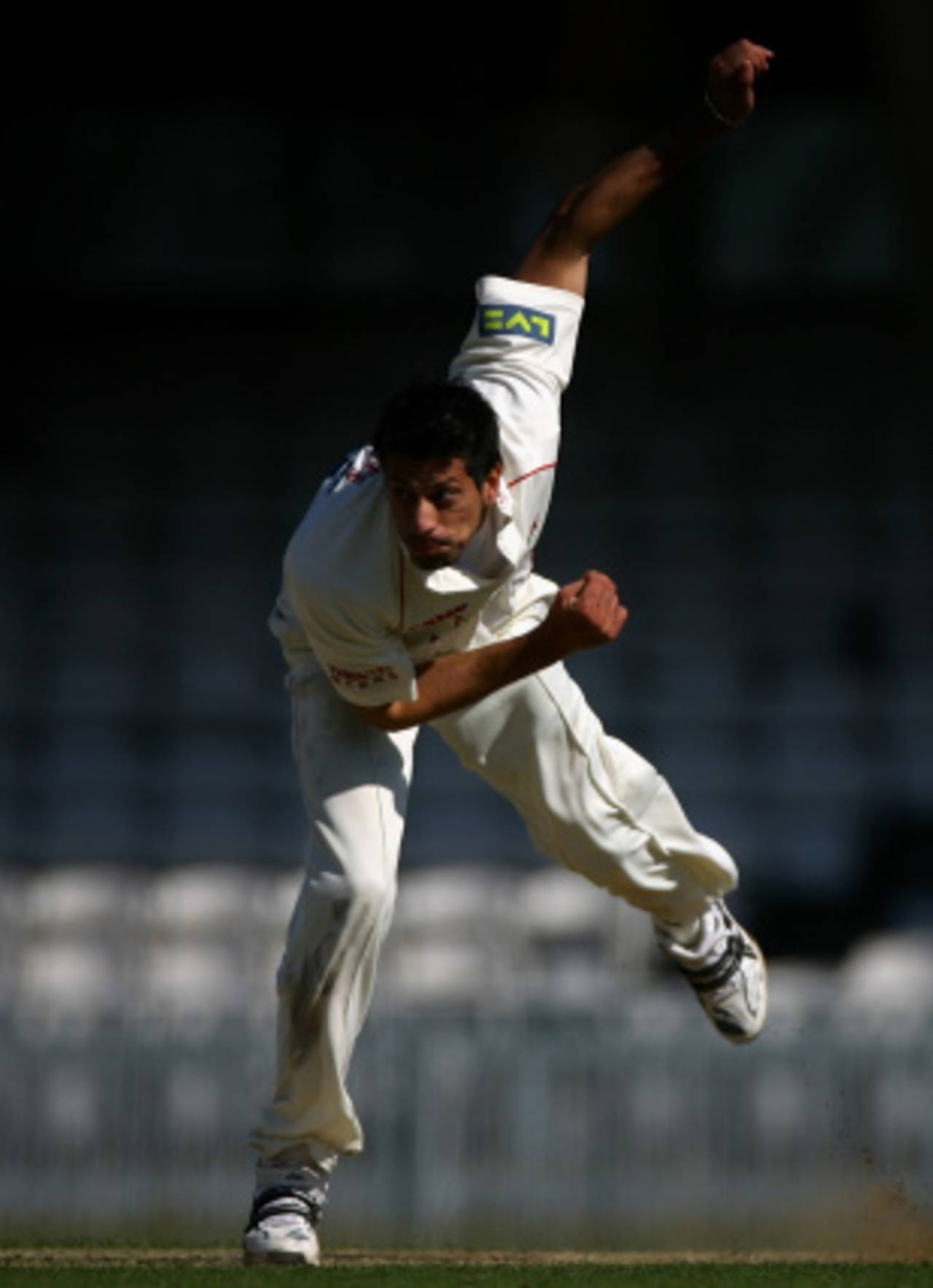Remember Saj?
He was picked on the basis that international cricket needed bowlers who bowled fast. But while the prognosis was the right one, Mahmood wasn't
John Hotten
Nov 18, 2012, 3:04 AM

Sajid Mahmood hasn't been signed on by any county for the next season • Getty Images
In 2005, Duncan Fletcher had a vision of the future. Injury, bad luck, hubris, whatever, meant that his Ashes-winning England side would never appear together again. Fletch played his hunch and went searching: not for old-school fast bowlers like Glenn McGrath and Shaun Pollock, but for men like Brett Lee and Shaun Tait and Lasith Malinga. In his analytical way, he stared into the game that was starting to emerge and deduced that the next generation of batsmen would need to be detonated from the crease by swing at high pace. He wanted freaks who could bowl at 90mph. Sajid Mahmood, who was 22 and had been playing in the Bolton leagues not too long before, could. Fletcher called him up.
There is an alternative universe somewhere, a superstring vibrating away in a different space-time continuum, in which Fletcher - Sir Duncan now, perhaps - is still coaching England, and Mahmood is his noble spearhead, pace dying a little as his hair greys, but with the nous of 250 Test match wickets behind him.
I thought of all of this the other day when I drove past one of my favourite grounds. The leaves had begun to come down over the outfield. The grass was uncut and already starting to thicken for winter. The chains were up around the square. Early evening rain swept overhead. Something had come to an end. When I got home, the counties had announced which players they wouldn't be retaining, and one of them was Saj Mahmood.
Lots of others were on their way, a few of them quick bowlers, too: Jack Brooks, Ajmal Shahzad, Liam Plunkett. But they all had new gigs. Saj hadn't had his contract renewed. It's always a melancholy time, but in Mahmood was a story of more than just a county and a player running out of steam. He'd been at Lancashire for ten years, had more than 300 first-class wickets, but his last game for them had been a Friends Life game against Derbyshire in which he'd conceded 42 from 2.3 overs. He'd gone to Somerset on loan, and taken eight wickets in three games at just over 30.
The game did morph, but not quite in the way that Fletcher thought it might. Tait, Malinga, and to an extent Lee, became white-ball specialists. Saj played eight Tests and got 20 wickets at 38. He bowled fast but inconsistently. Sri Lanka climbed into him in an ODI at The Oval; in 11 of his 26 one-dayers, he went for more than 50. In the last of his four T20 internationals, he bowled four overs for 61. Plunkett's record was quite similar.
When the news about Saj came out, several reports mentioned Fletcher's idea about the 90mph bowlers. It was couched in terms of failure and it seems that Mahmood will forever be its public symbol. And yet England are at the moment stocked with more men who can bowl at 90mph than perhaps ever before: Stuart Broad, Steven Finn, Chris Tremlett, Jade Dernbach, Stuart Meaker, Shahzad, and with lots more tweenies on the way at Loughborough, where David Parsons and his men have identified the physiological factors common to those who will be able to propel the ball at such a speed. Australia and South Africa appear to have caught on to it too.
The truth may be that the international career of Mahmood dropped into a gap in the game, a brief interregnum between generations, between old and new, between pre- and post-T20. It might be that they were just below international class, too. But as a concept, the notion that fast bowlers would have to bowl fast was being borne out even as Fletcher's idea was being stitched once more into stories about Saj Mahmood.
Fletch is with India now, of course, where he can be alone with his thoughts about 90mph bowling. Saj Mahmood, for the moment, isn't with anyone. Something had come to an end after all, something good, an opportunity that proved fleeting and elusive and not quite his to seize.
John Hotten blogs at theoldbatsman.blogspot.in